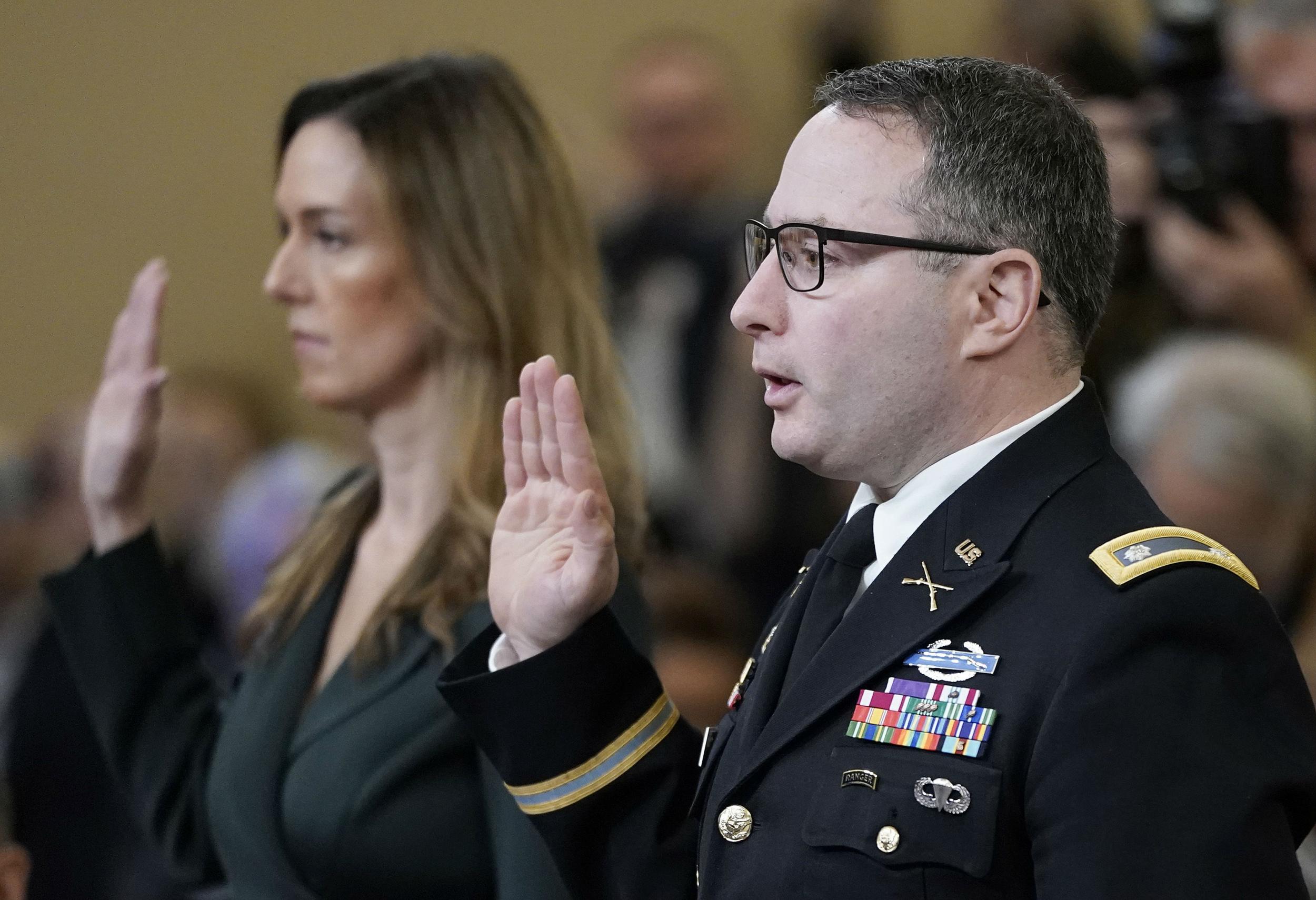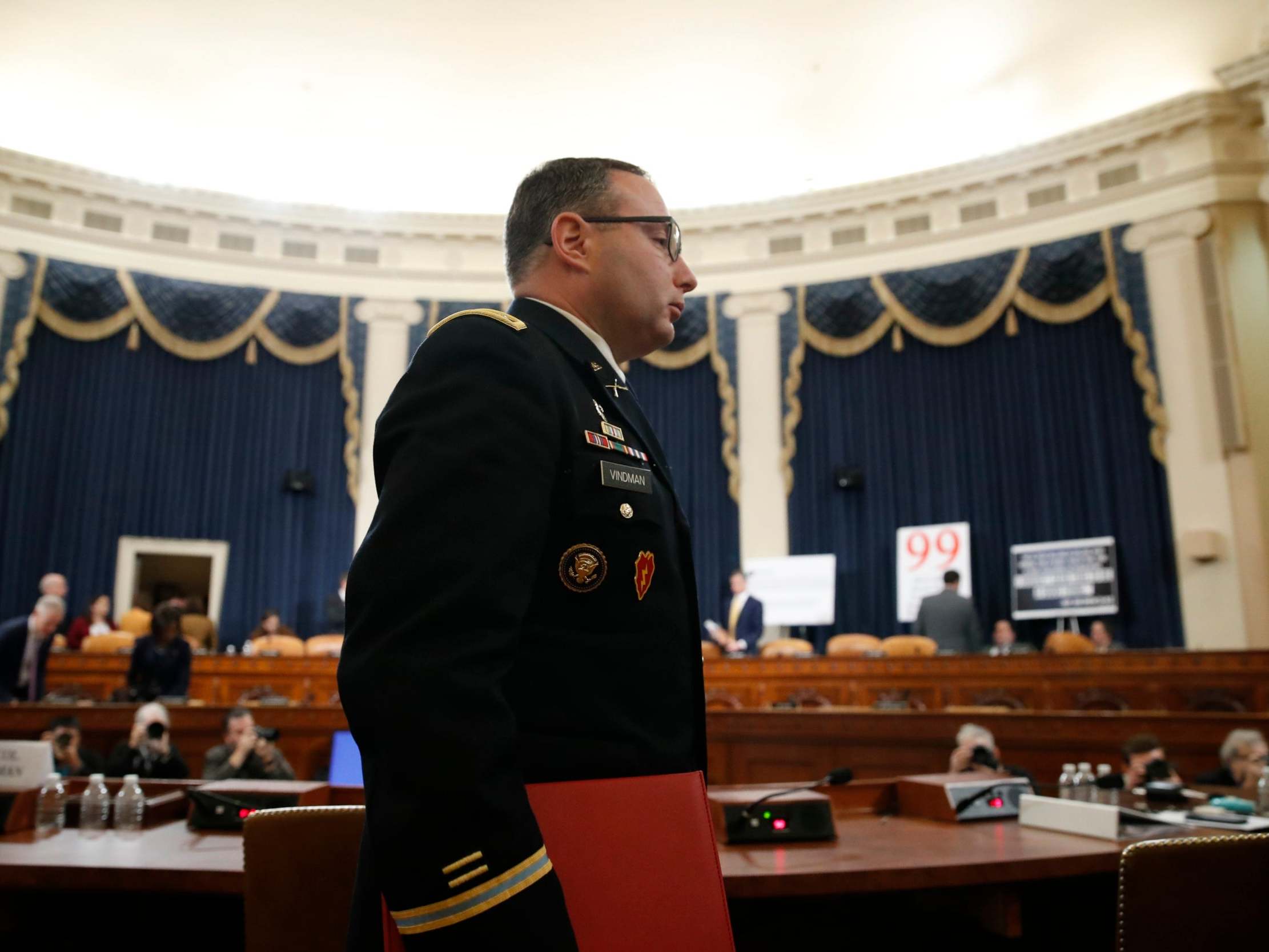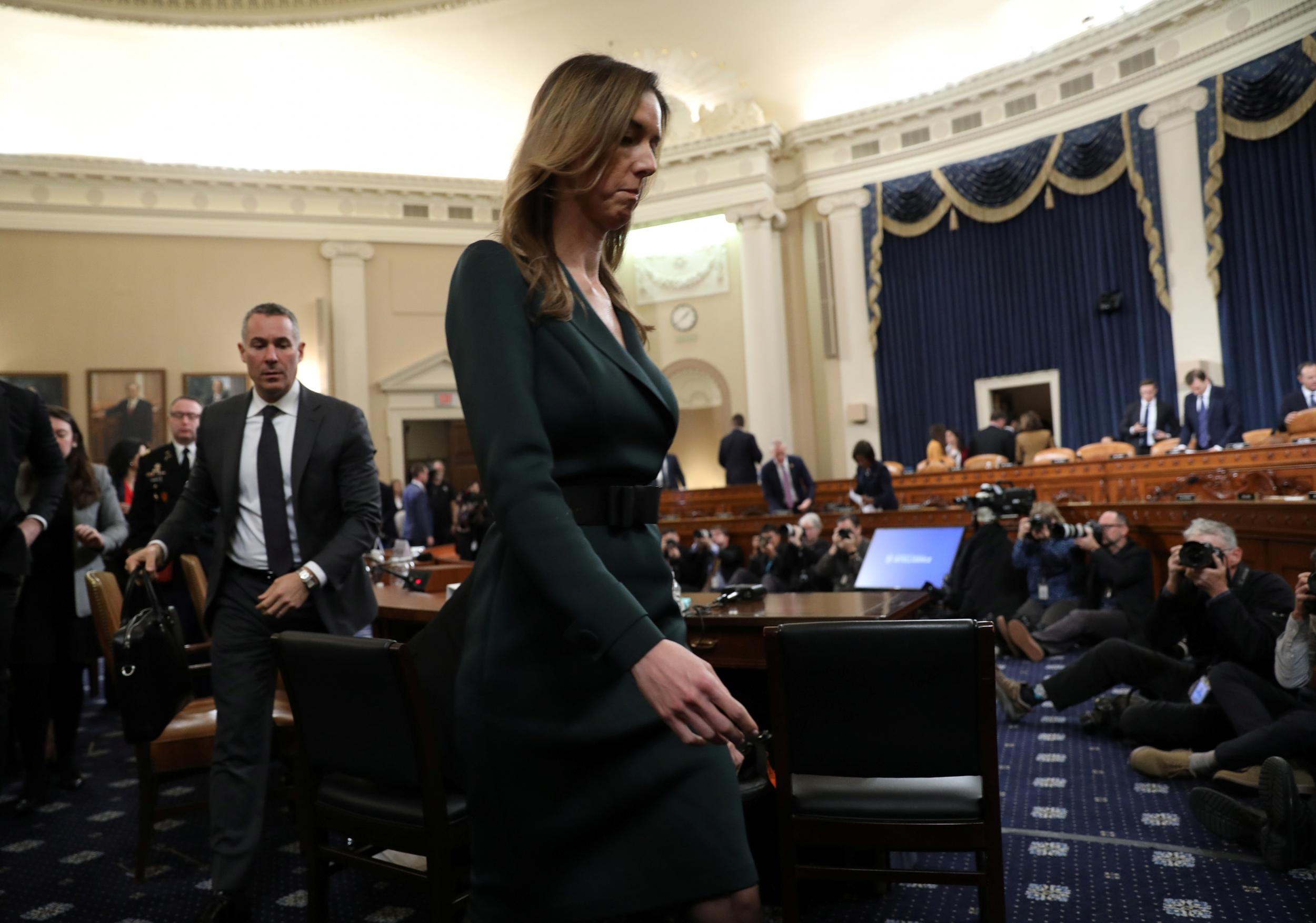Dubious, unusual, and concerning: How impeachment witnesses described Donald Trump's Ukraine coercion
Officials who sat in on infamous 25 July phone call gave evidence on Tuesday

With the start of the second week of public impeachment hearings under way, the country has now heard from a decorated war veteran and an aide to vice president Mike Pence.
Lt Col Alexander Vindman and foreign service officer Jennifer Williams kicked off proceedings on Tuesday, with both describing the potential perilous situation that could have been caused if American military aid was withheld from Ukraine — something Donald Trump allegedly threatened to do to coerce the nation into investigating 2020 rival Joe Biden.
These are some the key quotes from the hearing:
“I was concerned by the call. What I heard was inappropriate, and I reported my concerns to [National Security Council legal advisor John] Eisenberg. It is improper for the president of the United States to demand a foregin government to investigate a US citizen and a political opponent,” Lt Col Vindman said.
“It was also clear that if Ukraine pursued an investigation into the 2016 elections, the Bidens, and Burisma it would be interpreted as a partisan play. This would undoubtedly result in Ukraine losing bipartisan support, undermining US national security, and advancing Russia’s strategic objectives in the region."

Lt Col Vindman said that he reported the 25 July phone call out of a “sense of duty”, and noted that he did so “privately” within the White House — he did not seek a national spotlight. Then, he returned to work.
This testimony is important on several fronts. It is a decorated war veteran with a long history serving the United States saying that Mr Trump’s efforts to pressure the Ukrainian government broke with normal US approach to international relations. But, it also illustrates that the pressure to investigate Joe Biden could have wide-ranging impacts including on US national security. In undermining the US position in Ukraine, that could also help Russia.
“I also recognise that my simple act of appearing here today, just like the courage of my colleagues who have also truthfully testified before this committee, would not be tolerated in many places around the world. In Russia, my act of expressing concern to the chain of command in an official and private channel would have severe personal, professional repercussions and offering public testimony involving the president would surely cost me my life,” Mr Vindman said.
This line came as Mr Vindman was describing to the committee his family’s history. Mr Vindman is an emigrant from the Soviet Union, whose family embraced military service after moving to the United States.
In this quote, Mr Vindman is drawing attention to his and his family’s dedication to service in the United States — it’s harder to attack a decorated war veteran with a Purple Heart on his chest — but also sticking up for the other individuals who have testified to the committee so far.
He is also drawing attention to the danger of Mr Trump’s attacks on witnesses, even if they don’t amount to the assassination he described would be the norm in Russia. Attacking dissidents is a major first step towards authoritarianism.

“Chairman, without hesitation I knew that I had to report this to the White House counsel. I had concerns, and it was my duty to report my concerns to the proper people in the chain of command,” Mr Vindman said.
“As I said in my statement, it was inappropriate, it was improper for the president… to demand an investigation into a political opponent, especially a foreign power where there is, at best, dubious belief that this would be a completely impartial investigation. And that this would have significant implications if it became public knowledge, and it would be perceived as a partisan play, it would undermine our Ukraine policy, and it would undermine our national security.”
Mr Vindman is here laying out a powerful argument that contradicts a key Republican talking point, which is, why wouldn’t Mr Trump ask Ukraine for help with an investigation into the Bidens?
The answer, according to Vindman here, is that there is no reason to believe that any such Ukrainian investigation would be trustworthy, and would instead be “dubious” that the investigation would be impartial.
“Both of you recall president Zelensky in that conversation raising the issue, or mentioning Burisma, do you not?” asked Mr Schiff
“That’s correct,” said Ms Williams.
“Correct,” Mr Vindman said.
“And yet, the word Burisma appears nowhere in the call record that has been released to the public, is that correct? …. Do you know why that’s the case?” Mr Schiff asked.

Mr Schiff is pointing out here that, in spite of Mr Trump’s frequent use of the call memo as absolute proof about what was said during the call, there are some omissions.
While Mr Vindman said it was not a significant omission, Mr Schiff pressed him further, and asked if Mr Zelensky bringing up the company was a signal that the Ukrainian had been prepped for the call, and to expect the issue to come up. He noted that it appears as though Mr Zelensky was therefore prepared to talk about the issue.
This would reinforce reporting and testimony that the issue was not brought up as a second thought during the 25 July phone call, and back up the idea that the phone call followed a months-long campaign to push for the investigation.
“No,” Mr Vindman said when asked if Mr Trump’s statements about conspiracy theories were included in prepared talking points for the president.
Mr Vindman testified that members of the National Security Council prepare talking points for the president and other officials on these calls, so that they can be prepared, and to ensure that they stick to US policy.

The witness said that that Mr Trump had the ability to choose to use the talking points or not, but that they were not consistent with what he had provided Democratic counsel Daniel Goldman that apparent conspiracy theories — including that Ukraine interfered in the 2016 election, and that “the server” was in Ukraine hands — mentioned were not based on talking points.
“So it is a part of US official policy that Ukraine should root out corruption even if president did not mention it… in that phone call?” Mr Goldman asked.
“Correct,” Mr Vindman said when asked if Mr Trump mentioned rooting out corruption in an April or July phone call between the US president and Mr Zelensky.
Mr Goldman was here walking Mr Vindman through another discrepancy between the call log provided by the White House, and the apparent actual substance of the conversation.
Mr Vindman noted that including that information on the log would be consistent with US policy, but that the issue was not brought up specifically by the president. This is interesting at least in part because Mr Trump did push specifically for other concerns that are not consistent with US policy — an investigation into a domestic political rival — but did not mention corruption itself.
“Dad, my sitting here today, in the US Capitol talking to our elected officials is proof that you made the right decision forty years ago to leave the Soviet UNion and come here to the United States of America in search of a better life for our family. Do not worry, I will be fine for telling the truth,” Mr Vindman said in his opening remarks.
Lt Col Vindman described in his opening remarks his family’s emigration to the United States from the former Soviet Union, and it is hard not to see the weight of the ending to this comment. In an impeachment effort that has not been light on accusations of intimidation, Lt Col Vindment is confident that he is safe describing his experience.
“It is natural to disagree and engage in spirited debate, this has been our custom since the time of our Founding Fathers, but we are better than callow and cowardly attacks,” Lt Col Vindman said.
Lt Col Vindman here appears to be referencing attempts to intimidate him and others in the impeachment inquiry, and casts the effort as dishonorable.
The Trump-Zelensy call was “unusual” because “it involved discussion of what appeared to be a domestic political matter,” said Ms Williams.
Ms Williams, like Lt Col Vindman, had served American interests abroad longer than during just this presidency. And, she said that she had sat in on many presidential calls, but had not encountered anything close to Mr Trump’s effort to push for an investigation into Mr Biden.
“Representative Jordan, I did my job,” Lt Col Vindman said.
Congressman Jim Jordan and Lt Col Vindman clashed over his job performance, with the Republican claiming that his former boss — Dr Fiona Hill — had expressed concern with his job performance.
Lt Col Vindman responded to the accusations about his former boss by pulling out his last performance review from her, which he read: “Alex is top 1 per cent military officer and the best Army officer I have worked with in my 15 years of government service. He is brilliant, unflappable, and exercises excellent judgement’ — I’m sorry — ‘Was expemplary during numerous visits,’ so forth and so on. I think you get the idea.”
When attacked for consulting a lawyer with his concerns about Mr Trump’s call, Mr Vindman explained that he “did my core function, which is coordination”, and that his lawyer ultimately told him not to speak to anybody.
When attacked further by Mr Jordan, who complained that he would not tell him who the whistleblower is, Lt Col Vindman told him he simply did his job.
“I call myself never partisan,” Lt Col Vindman said.
Lt Col Vindman and Ms Williams were both asked if they consider themselves “never Trumpers” — meaning, people who would never support Mr Trump no matter the circumstances.
Both declined to do so.
Join our commenting forum
Join thought-provoking conversations, follow other Independent readers and see their replies
Comments
Bookmark popover
Removed from bookmarks